A way out will present itself, I thought, as I handed her the hilt. There was no hurry. She gestured for me to come back in beside her and I did. She whispered in my ear that she was sure we would be happy together for a long time and that I would be understanding when she had new guests.
When he was drunk Achilles would take his knife and try to pierce his hand or, if he was very drunk, his heart, and thereby were the delicate blades of many daggers broken. Odysseus, who had seen more than one such demonstration, rained praise on him for his extraordinary mettle, which made Achilles bridle like a puppy, but privately worried that a man immune to death must soon despise the mortals around him. Certainly Achilles thought little enough of the Trojans. Odysseus had seen him emerge from battle bristling with black arrows — as he undressed to bathe the shafts came away with his armor and he would loll in his bronze tub while Briseis* washed his unscathed limbs and Patroclus told jokes.
Wounds fascinated Achilles. When Patroclus got a scratch Achilles would fuss over him like an old nurse, endlessly bandaging and salving what could as well be left alone. But when a Greek was mortally wounded, even one of his own men, Achilles would not so much as look at him. When the bodies of the fallen were wound in orange sheets and burned on a pyre, Achilles was always elsewhere.
On the field Achilles was haggard with rage, to all appearances pursuing a vendetta, as though the Trojans had plotted to steal his cattle or his standing. His style was uninformed by tactics or consequences. A high wave surging onto shore, breaking over a dune and washing the sand away in a foaming tumult — so it was when Achilles struck an enemy line. Odysseus often trailed behind him to pick off the wounded and terrified.
Odysseus noticed that although Achilles was indifferent to blows, he received very few, apparently because his enemies were too dismayed to attack him intelligently. Odysseus considered imitating him but decided that the enabling recklessness had to be deeply felt. He did, however, make a mental note to be cautious of men with nothing to lose.
Achilles barely suffered the presence of King Agamemnon — he would talk over him in council and walk past him in camp without so much as a nod. With uncharacteristic self-possession, Agamemnon put up with it, perhaps because it was not clear how he could retaliate. The aristocracy joined Agamemnon in hating Achilles but the rank and file loved him — when the mood took him he would beggar himself in generosity, giving away his gold and spears and slaves to some warrior whose smile he liked or who had done a brave thing in battle.
One night when innumerable watch fires burned on the Trojan wall, Odysseus was summoned to Agamemnon’s tent. There he found the High King with Nestor and Menelaus speaking darkly over a single candle. Nestor pulled Odysseus close and whispered that Achilles, only half drunk, had been talking mutiny, strutting around camp and proclaiming that he was nearer a god than a man and it was unseemly that a mere contemptible mortal should command him, especially when that mortal could not even take one city in seven years’ siege. His Myrmidons laughed and encouraged him. Agamemnon said that while Achilles was a terror to his enemies, he was nevertheless more boy than man and any enterprise of his which did not hinge on his sword-arm would end in disaster.
The discussion turned to the method of Achilles’ dissolution. Though he was proof against weapons and no one had ever known him to get sick, he could, they reasoned, be bound. He could be tricked into a mine and buried in a deep shaft under heavy stones where only bats would hear him calling. He could be immersed in molten iron and wrought into an ingot to be dropped into the sea, there to spend eternity listing in deep currents. He could be locked into a heavy chest and hidden in a secret compartment in a trader’s ship, itinerant, anonymous and never seen again. But besides the innate difficulty of inflicting these schemes on a man who was fearless, invulnerable and an exuberant killer surrounded by loyal and heavily armed friends, there was his mother, Thetis, a sea nymph who loved her son dearly and had the ear of Zeus the cloud-gatherer, who saw everything. Odysseus reflected on the problem for a while and told them not to worry, he would take care of everything.
Three nights later he went into Achilles’ tent in the small hours and crouched by his cot. “Achilles, wake up. I’m setting an ambush for the Trojans by the Scamander and I need you,” he whispered. Achilles shrugged off sleep and, laughing at Father Odysseus’s sudden boldness, buckled on his armor.
They went silently over the white starlit plains to a hive-shaped tomb on a hill over the river. The tomb’s door was open. Achilles reluctantly followed Odysseus into the low cool earthy room where pale bodies lay wrapped in flame-colored cloth, from which Achilles averted his eyes. “Wait here,” Odysseus said, “I will call like an owl when they’re coming.” “I will go with you,” said Achilles. Odysseus said, “No. You can break men but lack subtlety. I will go hide and watch and when the time comes for killing, then you join me.” Achilles’ eyes glowed like a cat’s in the faint light as Odysseus shut the tomb’s door and barred it behind him.
In high good humor, Odysseus walked into the hills to the camp he had prepared. For three days he stared out to sea and drank in the silence. On the third night he left his tent and returned to the tomb. Pausing in front of the tomb’s door, he envisioned pursuing spearmen — his breath quickened and he started to sweat. Unbarring the door, he said, “Achilles! Forgive me — I was taken unawares and only tonight managed to escape, I think,” and peered fearfully over his shoulder. He had composed a story in which he had been captured but made the Trojans think that he was a wanderer who had come to Troy to loot the battlefield dead. He had concocted a detailed description of the notional patrol that caught him and even a back-story for his character as a looter. These preparations proved unnecessary. Within the tomb Achilles sat with his eyes closed, concentrating on each slow, shuddering breath.
The next morning Odysseus told Agamemnon that Achilles had gone away, having concluded in the course of his imprisonment that he should alleviate suffering rather than cause it. This explanation was deemed suspect but Achilles’ absence, sorely felt, was a certainty.
Subsequently it was said that he had gone away into the East and become an ascetic or a sophist. Over the years stories trickled in, most of them hardly credible: Achilles had begged in the streets, preached to animals in the waste or spent a year in contemplation in the shadow of a tree. The Greeks neither credited these travelers’ tales nor thought that they diminished his lingering glory.
*A slave girl, the captive of his spear, of whom Achilles was fond.
Odysseus clung to his raft of sticks as he was washed through the breakers and onto the shore of another island in the sequence of islands that filled his days. On the narrow shore the cold rain hit him and he found himself missing the warmth of the sea. He saw firelight in a cave, pulled himself up and staggered toward it. It occurred to him to walk in and throw himself on the mercy of the occupants but instead he thought, “One more time,” and crept through the freezing, rain-soaked night to listen.
Within, three women sat around a snapping fire. The shadows on the wall behind them were the blurred silhouettes of sweet maiden, stout matron and bent crone, but as the firelight flickered the shadows took other forms — a long-armed ogre with grasping hands, a bird of prey with unfurled wings, a net with glass floats (their iridescence gleaming on the rough rock walls), or, sometimes, nothing at all. They debated loudly to be heard over the rain and the fire, which, for all the violence of its burning, made more smoke than light.
Читать дальше












